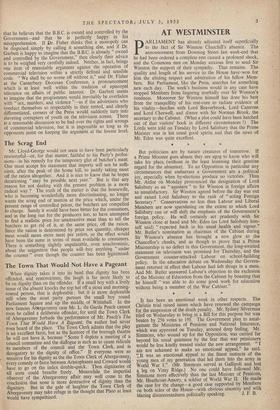AT WESTMINSTER
pARLIAMENT has already adjusted itself superficially to the fact of Sir Winston Churchill's absence. The announcement from Downing Street last week-end 'that he had been ordered a complete rest caused a profound shock, and the Commons met on Monday anxious first' to send Sir Winston the support of their sympathy. That remains. The quality and length of his service to the House have•won for him the abiding respect and admiration of his fellow Mem- bers. But Parliament, like the Press, searches for something new each day. The week's business would in any case have stopped Members from lingering morbidly over Sir Winston's tiredness. Moreover Sir Winston himself has done his best from the tranquillity of his rest-cure to radiate evidence of his vitality—lunches with Lord Beaverbrook, Lord Camrose and kord Cherwell, and dinner with Sir Norman Brook, the secretary to the Cabinet. (What a plot could have been hatched out of that visitors' book in different circumstances !) The Lords were told on Tuesday by Lord Salisbury that the Prime Minister was in his usual good spirits and that the news of Mr. Eden was quite excellent.
* * * * But politicians are by nature creatures of tomorrow. If a Prime Minister goes absent they are agog to know who will take his place (without in the least lessening their genuine regard for the absentee). To an Opposition in particular any circumstances that embarrass a Government are a political joy, especially when by-elections produce no victories. Thus Mr. Attlee on Monday pronounced the designation of Lord Salisbury as an " assistant " to Sir Winston in foreign affairs as unsatisfactory. Sir Winston agreed before the day was out and raised Lord Salisbury to the rank of " acting Foreign Secretary." Conservatives no less than Labour and Liberal Members are now speculating on the extent to which Lord Salisbury can or will shift the emphasis of the Government's foreign policy. He will certainly act prudently with Sir Winston close at hand and Mr. Eden (as Lord Salisbury him- self said) " expected back in his usual health and vigour." Mr. Butler's nomination as chairman of the Cabinet during Sir Winston's absence has brought a new glow to the Chancellor's cheeks, and as though to prove that a Prime Ministership is no defect in this Government, the long-awaited statement on television was promised for Thursday, and the Government counter-attacked Labour on school-building policy. In the education debate on Wednesday the Govern- ment retorted in effect that Labour had left things in a mess. And Mr. Butler answered. Labour's objection to the exclusion of the Minister of Education from the Cabinet by boasting that he himself " was able to do some good work for education without being a member of the War Cabinet."
* * * * It has been an emotional week in other respects. The Chiistie trial raised issues which have renewed the campaign for the suspension of the death penalty. Mr. Sydney Silverman tried on Wednesday to bring in a Bill for this purpose but was beaten by 256 votes to 195. The Government plan to amal- gamate the Ministries of Pensions and National Insurance, which was approved on Tuesday, aroused deep feeling. Mr. Simmons, who wound up for the Opposition, was carried far beyond his usual quietness by the fear that war pensioners would be less kindly treated under the new arrangement. " I am not ashamed to make an emotional appeal," he said. !.:, It was an emotional appeal to the finest instincts of the young men of my generation that led them into the army in World War I." (Mr. Simmons served at Gallipoli and lost a leg on Vimy Ridge.) No one could have followed Mr. Simmons more effectively than the last Minister of Pensions. Mr. Heathcoat-Amory, a soldier of World War II. He made the case for the change—a good case supported by. Members on both sides of the House—with obvious sincerity and with blazing disinterestedness politically speaking. J. F. B.


























































 Previous page
Previous page